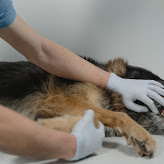1. Introduction: Understanding Allergies in Dogs
Allergies are not limited to humans; our furry companions can also experience allergic reactions. If you've noticed your dog scratching excessively, experiencing skin irritations, or displaying respiratory issues, it's possible that they may be allergic to certain plants or insect bites. Understanding and identifying these allergies is crucial in providing the best care for your pet. This article will delve into the various types of allergies that can affect dogs, with a specific focus on plant allergies and allergic reactions to insect bites. We'll explore common triggers, symptoms, prevention techniques, treatment options, and ways to reduce allergen exposure, ultimately promoting a healthier life for allergy-prone dogs.
1.1 What are allergies in dogs?
Allergies in dogs are not just limited to humans complaining about their seasonal sniffles. Just like us, our furry friends can also experience allergic reactions. When dogs encounter certain substances, their immune system may overreact and produce an allergic response. These substances, known as allergens, can be found in various forms, including plants and insect bites.1.2 How common are allergies in dogs?
Allergies are more common in dogs than you might think. According to some estimates, around 10% of dogs suffer from allergies. Just like people, dogs can develop allergies at any point in their lives. So, even if your pooch has been carefree in the past, allergies can knock on their doggy door unexpectedly.2. Types of Allergies in Dogs
2.1 Food allergies
We all have that one friend who claims to be allergic to gluten but conveniently enjoys a slice of pizza on the weekends. Well, turns out, dogs can have their version of food allergies too. Some canines may experience an adverse reaction to certain ingredients like beef, dairy, or grains. So, next time your pup seems itchier than usual, maybe skip the pepperoni treats.2.2 Environmental allergies
Just like us, dogs can be affected by environmental allergies. These allergies are triggered by substances like pollen, dust mites, or mold. Your pup might start itching, sneezing, or rubbing their face on the carpet, much to their embarrassment. So, don't be surprised if your dog asks for a prescription of antihistamine next time you pick up your own allergy meds.2.3 Flea allergies
Fleas may seem like tiny, harmless creatures, but for some dogs, they can be the ultimate nightmare. These little bloodsuckers can cause more than just itchy bites – some dogs can develop an allergic reaction to flea saliva. So, while you're busy protecting yourself from these pesky critters, make sure your furry friend is well-protected too.3. Allergies Caused by Plants: Identifying Triggers
3.1 Plant allergies in dogs
Plants might be the green beauties of our gardens, but for certain dogs, they can be a prickly situation. Dogs can be allergic to plant substances like pollen, sap, or even the touch of certain leaves. So, while your pup might enjoy rolling in the grass or sniffing flowers, keep an eye out for any allergic reactions that might bloom.3.2 Identifying plant allergy symptoms
How do you know if your dog is suffering from a plant allergy? Look out for signs like excessive itching, redness, swelling, or hives on their skin. You might also notice sneezing, coughing, or watery eyes. If your furry friend starts exhibiting these symptoms, it's time to put your detective skills to work and identify the plant culprit.4. Common Plants That Can Trigger Allergies in Dogs
4.1 Pollen-triggered allergies
While we humans might appreciate the beauty of blooming flowers, some dogs might see them as nothing more than pollen bombs. Certain plants, like ragweed or grasses, produce pollen that can trigger allergic reactions in dogs. So, next time your pup asks for a doggy mask during spring, maybe they have a valid reason.4.2 Toxic plants causing allergic reactions
Some plants not only cause allergies but can also be toxic to our furry friends. Plants like poison ivy, oak, or sumac can cause irritation and allergic reactions on contact. So, while you're busy avoiding these hazardous plants yourself, make sure your pup stays far away from them too. A little fashion advice: doggie hazmat suits might not be a bad idea. Remember, if you suspect your dog has allergies, it's always best to consult with a veterinarian. They can help identify the specific allergens and recommend appropriate treatments to keep your four-legged friend happy, healthy, and itch-free.5. Allergic Reactions to Insect Bites: Symptoms and Prevention
5.1 Common insects that cause allergies in dogs
Did you know that our furry friends can also suffer from allergies caused by pesky insects? Some common insects that can trigger allergic reactions in dogs include fleas, mosquitoes, ticks, and even bees. These tiny critters may seem harmless, but for some dogs, their bites can lead to uncomfortable symptoms.5.2 Recognizing allergic reactions to insect bites
Just like humans, dogs can have allergic reactions to insect bites. If your canine companion starts itching excessively, develops red and swollen skin, or experiences hair loss in certain areas, it could be a sign of an allergic reaction. Other symptoms may include hives, rashes, and even respiratory distress. If you notice any of these signs, it's essential to consult your veterinarian for a proper diagnosis.5.3 Preventive measures for insect bites
Prevention is key when it comes to protecting your dog from allergic reactions caused by insect bites. Regularly checking your pet for ticks, using flea preventatives, and avoiding areas with high mosquito activity can significantly reduce the risk. Additionally, keeping your dog indoors during peak insect hours and ensuring their living area is clean and free of pests can help keep those allergic reactions at bay.6. Managing Allergies in Dogs: Treatment Options
6.1 Veterinary diagnosis and allergen testing
When it comes to managing allergies in dogs, a proper diagnosis is crucial. If you suspect your dog has allergies, your veterinarian can perform tests to identify the specific allergens causing the reactions. This may involve skin tests, blood tests, or elimination diets to pinpoint the culprits and tailor the treatment accordingly.6.2 Medications for allergy relief
To provide relief from allergies, veterinarians may prescribe medications such as antihistamines, corticosteroids, or immune modulators. These medications can help alleviate itching, reduce inflammation, and control the immune response. However, it's important to follow your vet's guidance and never give your dog any medication without professional advice.6.3 Immunotherapy and desensitization
In some cases, veterinarians may recommend immunotherapy or desensitization treatments for dogs with allergies. This involves exposing the dog to small amounts of the allergen over time, gradually building up their tolerance. While these treatments may require patience and dedication, they can be highly effective in reducing the severity of allergic reactions and improving your dog's quality of life.7. How to Reduce Allergen Exposure for Dogs
7.1 Creating an allergen-free environment
Creating an allergen-free environment for your dog can significantly help in managing their allergies. Regularly vacuuming and cleaning the house, using air purifiers or filters, and keeping bedding clean can reduce allergens like pollen and dust mites. Opting for hypoallergenic pet products and avoiding scented candles or air fresheners can also contribute to a healthier living space for your furry friend.7.2 Allergen avoidance in outdoor settings
While it's challenging to control outdoor allergens entirely, there are precautions you can take. When taking your dog for a walk or spending time outdoors, try to avoid areas with high plant pollen or insect activity. Wiping your dog's paws and coat after being outside can help remove allergens they may have picked up during their adventures.7.3 Grooming and hygiene practices
Regular grooming can help reduce your dog's exposure to allergens. Bathing your furry friend with hypoallergenic shampoos and using a conditioner specifically formulated for sensitive skin can soothe itching and remove allergens from their coat. Additionally, regularly cleaning their ears and brushing their teeth can contribute to their overall hygiene and minimize the risk of secondary infections.8. Conclusion: Promoting a Healthy Life for Allergy-Prone Dogs
While dogs can indeed be allergic to certain plants or insect bites, there are various ways to manage their allergies and promote a healthy life. By recognizing the symptoms, taking preventive measures, seeking veterinary guidance, and reducing allergen exposure, you can help your furry companion lead a more comfortable and allergy-free life. Remember, it's important to consult your veterinarian for proper diagnosis and treatment tailored to your dog's specific needs.By recognizing and addressing allergies in dogs, we can help our beloved pets lead healthier and happier lives. Whether it's understanding the different types of allergies, identifying plant triggers, or taking preventive measures against insect bites, there are various ways to manage and reduce allergic reactions. With proper diagnosis, treatment, and allergen avoidance, we can ensure that our furry companions thrive and enjoy the world around them without the discomfort of allergies. So, stay vigilant, seek veterinary guidance, and make the necessary adjustments to create an allergen-free environment for your dog. Together, we can support their well-being and provide a life filled with joy and vitality.
FAQ
1. Can dogs develop allergies to specific plants?
Yes, dogs can develop allergies to certain plants. Just like humans, dogs can have sensitivities to pollen, grasses, trees, or other plant allergens. It's important to be aware of the common plant triggers and recognize the symptoms of plant allergies in dogs.
2. How can I tell if my dog is allergic to insect bites?
Allergic reactions to insect bites in dogs can vary, but common symptoms include itching, swelling, redness, hives, and even difficulty breathing. If you notice any of these signs after your dog has been bitten by an insect, it's crucial to seek veterinary care promptly.
3. Can allergies in dogs be treated or managed?
Yes, allergies in dogs can be treated and managed. Your veterinarian can help diagnose the specific allergies your dog may have and recommend appropriate treatments. These may include medications for symptom relief, immunotherapy to desensitize your dog to allergens, and lifestyle adjustments to minimize exposure to triggers.
4. How can I create an allergen-free environment for my dog?
Creating an allergen-free environment for your dog involves various steps. Keep your home clean and dust-free, regularly wash your dog's bedding, vacuum frequently, and consider using air purifiers. Additionally, minimize exposure to potential allergens by avoiding areas with high pollen counts and keeping your dog away from toxic plants or known insect habitats.





